Spec Ops: The Line Review
|
|
See PixlBit's Review Policies

On 12/22/2012 at 12:00 PM by Julian Titus It's hard to see the line when it's drawn in the shifting sand... |

This is one of the best and most mature stories I've encountered in a video game. The gameplay leaves something to be desired, but I suggest anybody interested in interactive narrative give it a try.
When the creative minds of game designers come up against the practical, business-focused minds of game publishers it can lead to endless frustration. This frustration is shared by the consumers, wanting a unique gaming experience but also needing that experience to be something that they can instantly click with. This frustration is the crux of my feelings for Spec Ops: The Line, a game that pushes narrative into some refreshingly interesting places, but stumbles with game mechanics that smack of publisher homogenization.
After a massive and persistent sandstorm nearly buries the city of Dubai, the U.S. military sends troops in to initiate a complete evacuation. When it becomes clear that the evacuation isn’t an actionable operation, one platoon—the 33rd, led by Col. John Konrad—refuses to abandon the city. After six months with no contact from the 33rd, a garbled S.O.S. from Konrad is transmitted, and a small Delta Squad team is sent in to find the survivors and get them out of the desert no man’s land.
Spec Ops: The Line is a very focused narrative that centers on the leader of Delta Squad—Martin Walker. He’s backed up by his counter-sniper, Lugo, and his right hand man Adams who prefers to get up close and personal with his shotgun. As the trio makes their way into Dubai to find survivors it quickly becomes clear that things aren’t what they seem. Their mission goes from bad to FUBAR almost right away, and Spec Ops becomes a tale of dueling ideologies. What is more important: doing the right thing or following orders? Walker struggles with this question, and the stress of the situation becomes a danger to himself and his men.
By far, my favorite part of Spec Ops: The Line is the story. However, I'm hesitant to go into detail about why it was so impactful for me because to do so would spoil so much of what makes this game special. Walker’s story arc goes to some of the darkest places I’ve seen in a video game, and there are things addressed here that elevate Spec Ops as a package. This is a story about what happens when you're put into a situation that you aren't equipped to handle, even if you firmly believe you are. When all of your preconceived notions are questioned, can you stay strong, or do you crack under the pressure? It's getting the answers to these questions that makes the campaign of Spec Ops worth playing, and it will probably leave you with a few more questions when the final foe hits the sand and the credits roll.
Nolan North delivers an amazing performance as Walker, with even his normal battle dialogue evolving over the course of the game and reflecting the change in the character’s outlook. It's a startling and uncomfortable transition to have a cool and collected Walker in act 1 transform into a desperate and impatient man by the end, but North handles it like the consumate professional that he is. Even though I think that the game is a little too short and certain revelations unfold far too rapidly towards the final act, Spec Ops haunted me after completing it. This is one of those games that I can confidently hold up as an evolution of virtual narrative.
I just wish that the part where I have to play Spec Ops: The Line was better.
That’s not to say that this is a game suffering from broken controls or terrible AI. Spec Ops is a perfectly adequate third person shooter. The weapons pack a nice punch, with the grenades in particular being something to be feared on both sides of the conflict. For the first half of the game I got the impression that Yager was going for a realistic take on modern combat, as both your character and the enemy soldiers go down after only a few shots. This makes taking cover vital. Ammo is scarce in Dubai for obvious reasons, so battles become tense affairs where every shot counts.
So far, so good, right? Things start to feel a bit off once the enemies become more aggressive. Taking cover never feels quite right, thanks to an odd control choice. Instead of holding a button down to sprint, you press it once and let it go, but if you want to sprint into cover you need to hold the button down. It can cause Walker to spaz out at the most inopportune times, and even once he’s in cover things get a little sticky. Even by the end of the game I was constantly fighting the cover controls. Sometimes Walker would stay in cover even after I had pressed the A button to leave my current perch. When the A button did respond correctly it felt like he was too sluggish getting into and out of cover, leading to quite a few frustrating deaths. This makes avoiding those deadly grenades a needlessly troublesome affair. And no matter how many times I would duck while in cover, Walker would always stand when leaving cover, which seemed like a rookie mistake that he should have learned from in boot camp.
The cover mechanics are a problem, but something I was able to deal with most of the time. For me things went to hell when the game started to introduce “enemy types” in a bid to make the battles more “dynamic”. You have your “Elite” soldiers, who can apparently absorb double the damage of most human beings, thanks to their magical combat armor. Even headshots don’t seem to faze the Elites half the time. Then you have the “Knife” soldiers, who are somehow far more resilient and dangerous even though they just run up the field to get in close with a blade. The most out of place enemy is the “Heavy,” a soldier equipped with a high caliber weapon and head to toe body armor. The Heavies always look like walking tanks, standing a full head and shoulders above other troops. These varied soldiers smack of publisher influence, put into the game to help it fit into the typical third person shooter mould. Instead, they create annoying choke points of difficulty and go a long way towards shattering the realistic theme established at the outset of the game.
Dubai—reclaimed by the desert sands—is the backdrop for the tense story of Spec Ops. It’s a sight to behold a city that seems to have been swallowed up by the forces of nature. The wind rips through what’s left of the shining city spires, somehow shrunk to half their size by the shifting sands. Sand acts as a battle tactic at times, and breaking a window to unleash a wave of desert onto the enemies is always impressive. The artists at Yager do an amazing job of utilizing lighting techniques to give the decidedly brown and orange color palette of the game variety and depth. Any time I was able to get a good vantage point to see the destroyed city before me I couldn’t help but pause for a few moments to take it in. Dubai is as much a part of the story as Delta Squad, and the fact that it is so convincing is a testament to the environmental artists.
The same can’t quite be said for the rest of the game. Spec Ops suffers from the same problems that typically result from being built on the Unreal Engine 3 engine. The frequent texture pop-in is especially problematic during emotional cutscenes where the facial textures haven’t loaded completely. The men in Delta Squad are nicely detailed, and I give the art team props for making them look more and more banged up throughout the story. However, the rest of the soldiers and supporting characters don’t match up, probably a result of the massive amounts of moving sand and enemies on screen at any given time. It makes Spec Ops look uneven across the board, but there are moments when everything comes together just right.
Yager attempted to do something special with Spec Ops: The Line, and at times they succeed, especially when it comes to the narrative. However, video games are at their best when gameplay and story come together to deliver an experience that you can’t find outside of this medium, and Spec Ops rarely brings the two together in a cohesive manner. Even so, I found this to be one of the most impactful stories I’ve experienced this year on a console, and that’s something worth praising.


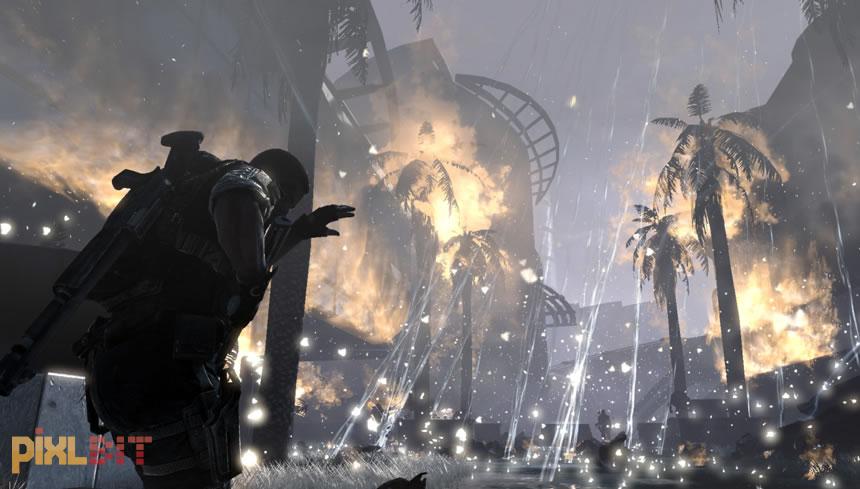
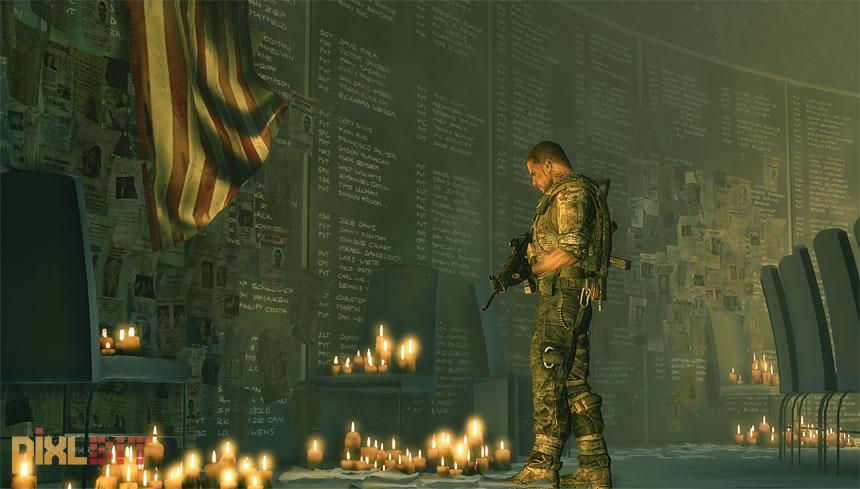
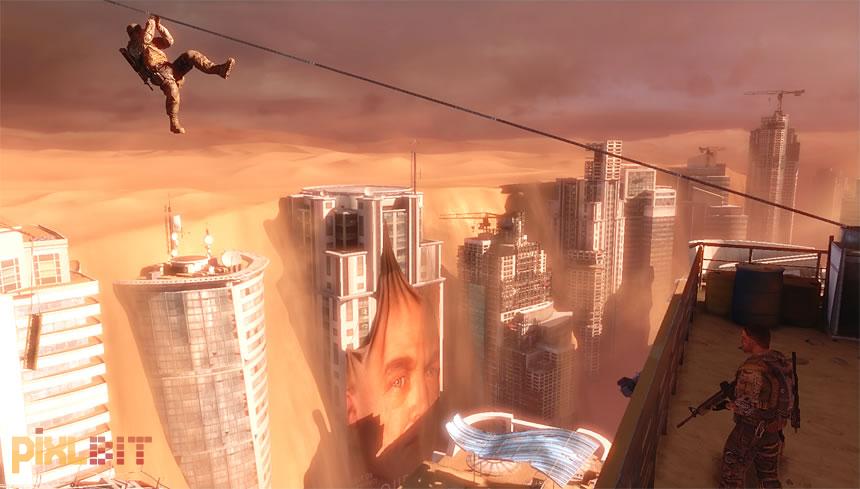
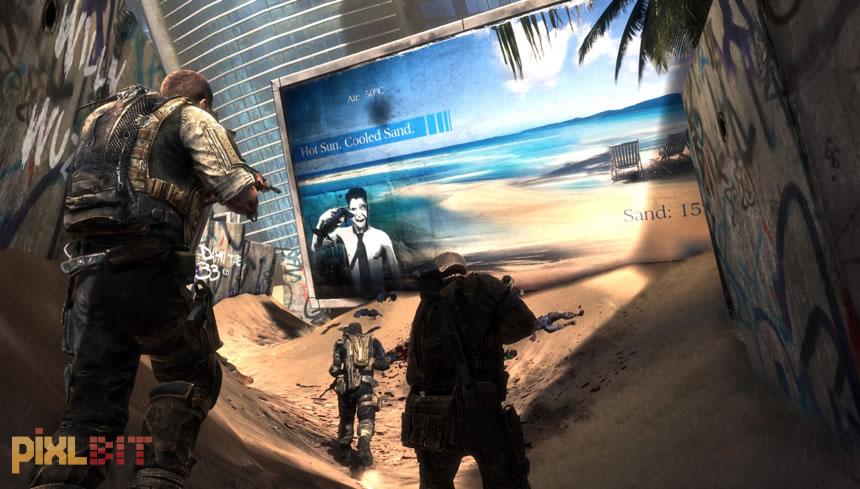






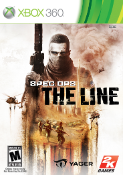

Comments